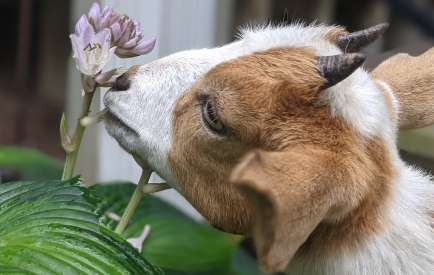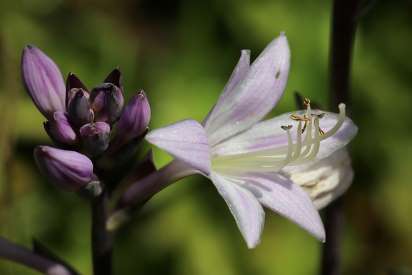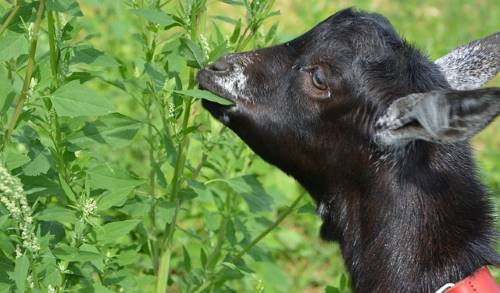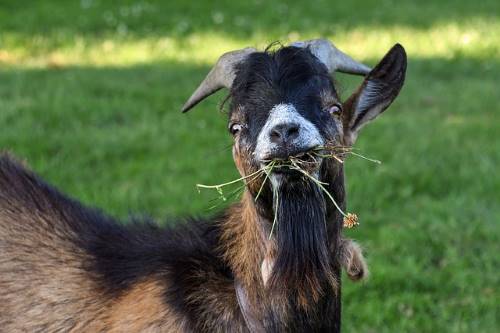Can goats eat hostas? Yes, goats can eat hostas. There are a number of sources online that mention hostas are poisonous to dogs so it is assumed they are poisonous to goats.
Many owners (including myself) have found our goats eating hostas with no ill effects. Goats are smart and if something is not good for their health, they will generally stay away from it.
There are a couple of things to remember when it comes to hostas and goats. Read on to learn everything you need to know about feeding hostas to your goats.

What are Hostas?
Hostas are a type of perennial plant that is often used in landscaping. The leaves of the hosta are what are eaten by goats and they can be either eaten fresh or dried for later use.
Hostas grow well in both full sun and partial shade and they come in a variety of colors, including white, green, blue, and purple. They can reach a height of up to 3 feet and can spread out just as wide.
The flowers of the hosta plant are also edible and can be eaten either fresh or dried.
[GoatAffiliate]
Can Goats Eat Hostas?
Yes, goats can eat hostas. However, it is important to remember that not all plants are good for goats and they should only be given access to plants that have been specifically designated as safe for them to eat.
When it comes to hostas, the leaves are the part of the plant that is eaten by goats. The flowers of the hosta plant are also edible, but they are not typically as palatable to goats as the leaves are.
It is important to note that hostas are poisonous to dogs, so it is assumed they are poisonous to goats as well. However, there are a lot of stories online from people who own goats and have let them eat hostas with no ill effects. Goats are clever and will avoid anything that is harmful to their health.
Are Hostas Poisonous to Goats?

There is some debate online about whether hostas are poisonous to goats. Some sources state that they are while others say that they are not. The general consensus, however, seems to be that hostas are poisonous to dogs but not goats.
There are many goat owners who have fed their goats hostas with no ill effects. However, if you are unsure whether or not hostas are poisonous to your goats, it is best to avoid feeding them this plant.
I have found my goats eating hostas on several occasions, and they have been absolutely fine.
Health Benefits of Hostas for Goats
There are a number of benefits to feeding your goats hostas. Here are just a few:
- Hostas are high in protein and fiber, making them a great addition to your goat’s diet.
- They are low in calories, making them a good choice for those looking to help their goats stay trim.
- Hostas contain important vitamins and minerals like vitamin A, C, and E, as well as potassium and magnesium.
- They are a good source of antioxidants, which can help keep your goats healthy.
Hostas are also a good source of chlorophyll, which can help your goats detoxify their systems. It’s a good idea to rotate your goats’ diet so they have access to a variety of plants that offer different nutritional benefits.
Are there any Risks in Feeding Hostas to Goats?
There is always a risk when feeding any plant to your goats that they may have an adverse reaction. It is important to do your research and make sure that the plants you are feeding them are safe for them to eat.
If you are unsure whether or not hostas are poisonous to your goats, it is best to avoid feeding them this plant. However, if you decide to give them access to hostas, always keep an eye on them to make sure they are not eating too much and having any negative reactions.
How to Prepare Hostas for Goats?

If you decide to give your goats access to hostas, it is best to do so in a controlled setting. This will allow you to monitor their intake and make sure they are only eating the leaves of the plant.
You can either provide your goats with fresh hostas or let them eat dried hostas. If you provide them with fresh hostas, make sure to clean them well before giving them to your goats.
Dried hostas can be given to your goats either whole or ground up into a powder.
It is important to note that not all plants are safe for goats and they should only be given access to plants that have been specifically designated as safe for them to eat.
How Often Can Goats Eat Hostas?
It is best to give your goats access to hostas on a limited basis. This will help ensure that they are getting the most benefit from this plant while minimizing any risks. I usually give my goats access to hostas once or twice a week.
Can Baby Goats (Kids) Eat Hostas?

Yes, baby goats can eat hostas. In fact, they can benefit from the nutritional value this plant provides. However, you should always monitor their intake to make sure they are not eating too much.
What Other Plants Can Goats Eat Apart from Hostas?
While hostas can be a part of a goat’s diet, it’s beneficial to offer a variety of plants to ensure a balanced and nutritious intake. Goats, known for their adventurous eating habits, can safely consume a wide range of vegetation. Below are five such plants – bamboo, roses, weeds, crepe myrtle, and wisteria – each offering its unique nutritional benefits. It’s important to remember, however, that moderation and variety are key to maintaining the health and well-being of your goats.
Bamboo
Yes, goats can safely eat bamboo. This fast-growing plant is not only an excellent source of fiber but also provides essential nutrients. Goats typically enjoy the leaves and the soft, younger shoots of bamboo. However, older bamboo can be tough and less palatable. Introducing bamboo into their diet can add diversity and is especially useful in areas where bamboo is abundant and needs controlling.
Read More: Can Goats Eat Bamboo? Simple Answer & Feeding Tips
Roses
Surprisingly, goats can eat roses, including the plant’s leaves and flowers. While the thorns might seem off-putting, goats often navigate around them or don’t seem bothered by them. Roses are a good source of vitamins and antioxidants, which can contribute positively to a goat’s diet. However, care should be taken to ensure that the roses haven’t been treated with pesticides or other chemicals.
Read More: Can Goats Eat Roses? Simple Answer & Feeding Tips
Weeds
Weeds are often a favorite for goats and can be a highly beneficial part of their diet. Goats are natural browsers and can help control weed populations in your fields or gardens. Many common weeds are rich in nutrients and provide a good source of roughage. However, it’s crucial to ensure that the weeds they consume are not toxic. Common non-toxic weeds for goats include dandelions, clover, and chickweed.
Read More: Can Goats Eat Weeds? Unraveling Their Surprising Diet
Crepe Myrtle
Crepe myrtle is generally considered safe for goats to eat. This plant can provide a decent nutritional snack for goats, though it shouldn’t make up a large part of their diet. The leaves and flowers of the crepe myrtle are what goats will likely nibble on. As always, ensure that the crepe myrtle hasn’t been treated with any chemicals that could harm your goats.
Read More: Can Goats Eat Crepe Myrtle? 3 Excellent Benefits
Wisteria
Caution is advised with wisteria. While goats may find the plant palatable, wisteria contains compounds that can be toxic. Consuming wisteria in large amounts may lead to digestive upset or more severe health issues. It’s generally recommended to keep goats away from wisteria, especially the seeds and pods, which contain the highest concentration of toxic substances.
Read More: Can Goats Eat Wisteria? 3 Important Risks
Can Goats Eat Hostas – Final Thoughts
There is some debate online about whether or not hostas are poisonous to goats, but the general consensus seems to be that they are. Goats can eat hostas but in moderation. However, there are some things to consider if you want to feed your goats these plants.
First of all, make sure that the plant has been grown organically or without pesticides and herbicides for at least two years before feeding them to your animals. This reduces the risk of any possible contamination with chemicals harmful to humans as well as animals.
Second, know how much they should be fed per day – which may vary depending on the type of plant being eaten (some types have more nutritional value than others) and whether they are pregnant/nursing mothers or young kids who need more nutrients than adults do). Finally, continue testing their stool after eating new foods just like you would with a human baby to make sure they’re tolerating the new food well.
Related Articles:
